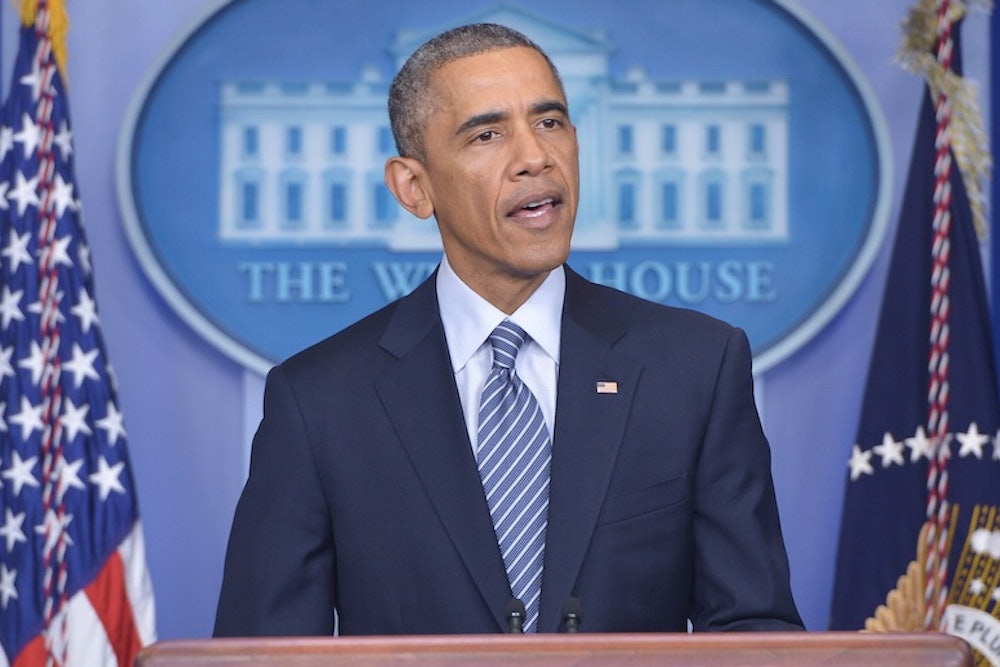President Barack Obama’s unwillingness to wade deeply into the thicket of passions, grievances, suspicions, and resentments that materialized after Michael Brown was killed in Ferguson, Missouri, has disappointed some of his strongest supporters. His decision has been interpreted as strategic retrenchment—a determination not to polarize the public’s impressions of Ferguson the way he did when he expressed a kind of racial solidarity with the parents of Trayvon Martin two and a half years ago.
The contrast between Obama’s approaches to the Brown and Martin cases has always been overstated. Bracket one poignant but contentious sentence—“If I had a son, he’d look like Trayvon”—and his responses to the two killings no longer seem so dissimilar. Even without an explicit presidential statement of commiseration, the public dialogue surrounding Brown’s killing polarized along depressingly familiar lines. Obama’s most impassioned comments about Martin came only after a jury acquitted George Zimmerman, not before Zimmerman had been indicted.
We have now effectively reached the same point in the Michael Brown case. There is no verdict, because Darren Wilson—the Ferguson police officer who killed Brown—won’t be charged with a crime.
The Grand Jury’s decision has reignited protests in Ferguson, and political leaders of all levels, including Obama himself, are pleading for restraint—mostly from the protestors themselves, but also from those who’ve taken up arms in anticipation of looting and riots. At the same time, Obama says he’s “going to wait and see” how the public reacts to the news before deciding whether to visit Missouri.
But he should go regardless. This is Obama’s first opportunity (for lack of a better word) to use the bully pulpit to steer the national agenda in a positive direction since the slaughter at Newtown, Connecticut, and it’s the first time since he became a national figure that he’ll be able to address a racially charged issue without an election in his future to deter him.
For the entirety of his presidency, and for much of his pre-presidency, Obama’s been too encumbered by a real but vague set of hindrances—his ambition, his temperament, an idealistic sense of a president’s significance to the country, and an acute awareness of his position in the country's racial firmament—to speak about racial issues with the candor that his attorney general, Eric Holder, has exhibited.
Holder has by some tellings been Obama’s emissary in places, including in Ferguson, where Obama believes his direct involvement would inflame rather than reduce tensions.
But the attorney general isn’t the president. Holder’s on his way out. He's still technically overseeing federal investigations in Ferguson. And more to the point, the circumstances surrounding Michael Brown’s death evoke more complex, and perhaps less polarizing issues than those that brought about the shooting of Trayvon Martin.
Martin’s killing was in some ways more racially fraught, or straightforwardly racial, than Brown’s. Zimmerman, Martin’s killer, wasn’t a police officer; Martin wasn’t suspected of a crime; and he was walking alone, in a predominantly white neighborhood. His killing sparked a debate about controversial gun laws, but his altercation with Zimmerman, the way the case was handled, and the verdict all spoke to racial disparities in the criminal justice system, and to an undercurrent of white vigilantism in conservative parts of the country. In the end, the story was about a zealot who killed an innocent black kid and got away with it.
Some of these factors apply to Brown’s killing and some don’t. But the very complexities that distinguish Brown’s case from Martin’s—that Wilson is a cop; that Brown was shot and killed at a distance with his hands in the air, according to some witnesses; that Ferguson police essentially turned on the residents they are paid to serve; that the overwhelmingly black community is governed by overwhelmingly white public officials—are what make Ferguson such a thorny issue. They’re also the things that make it so urgent for the president, but particularly this president, to give them proper context.
Brown’s killing isn’t just about race, or local police procedure, or the militarization of police, but civil rights, a vast array of racial disparities in America, and the cardinal importance of the franchise, all of which are connected to one another. Obama is uniquely suited to trace those connections. He should do so, in Ferguson.
